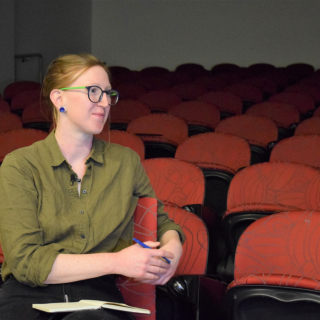Master of Environmental Management and Development

Overview
Make a meaningful contribution
Are you eager to make a real and lasting contribution to society’s big challenges, including climate change, pollution, water management, and sustainable agriculture? Then the Master of Environmental Management and Development (MEMD) degree can deliver the knowledge and skills you seek.
Upskill or retrain in an Australian Government National Priority Area
Crawford School is proud to offer this special professional learning opportunity.
Gain a better understanding of current issues and approaches to environmental management. Learn about current regulatory and policy frameworks in the Australian and international context and enhance your ability to contribute to the governance of environmental sustainability and natural disasters.
Study in-person or online
In 2025, all graduate courses offered by the Crawford School will be available for either in-person or online study. All students are expected to attend live sessions at particular times each week for their courses. Crawford online courses are not ‘study at your own pace’. International students studying on an Australian student visa should enrol in in-person courses.
Participation
Real-time interaction, discussion and debate between students and with convenors is a central part of the learning experience. Attendance at interactive classes is important for both on campus and online students.
Is the MEMD for me?
The MEMD program caters to a diverse range of participants: from policy-makers working in high-level government and nongovernment organisations across Asia and the Pacific, to policy officers and middle managers in Australian government and industry, to university graduates with limited work experience.
Why choose the MEMD?
If you‘re a pragmatic thinker prepared to consider a balance between sustainability issues and their impact on livelihoods and communities, you will be both challenged and rewarded by the MEMD program.
Delivered by the leading minds in the field—ANU is ranked #11 in the world for development studies—the program includes case materials on real-world issues from within Australia and across Asia and the Pacific. It will equip you with both the theoretical knowledge and the practical skills needed to devise policies that can achieve economic viability, social acceptability, and environmental sustainability.
The program also offers the flexibility to focus on electives specific to your career goals. These electives include energy security, natural disasters, biodiversity conservation, environmental conflict, food security, and rural development—to name just a few.
What are my career options?
When you complete the MEMD program, a wide range of local and international employment pathways will open up to you. Many of our graduates have taken up senior policy roles with local, state, and federal government. Others have gone on to influential positions with global development institutions, environmental agencies, nongovernment organisations, and social enterprises. Others still have elected to specialise in the private sector, where they are guiding sustainability strategies within large-scale mining and agriculture companies.
Application Deadlines
Please note application deadlines are different for domestic and international students.
Domestic students
This program is with pre-sessional program (PSP) component for domestic students.
• Semester 1 2025 intake:
Application closing date: 15 Dec 2024
Acceptance date: 3 Jan 2025
Start date: 13 Jan 2025
• Semester 2 2025 intake:
Application closing date: 31 May 2025
Acceptance date: 1 June 2025
Start date: 12 June 2025
International students
Find ANU’s general application and acceptance deadlines by visiting the webpage linked here.
Key dates for application:
• Semester 1 2025 intake for private applicants:
Application closing date: 31 Oct 2024
Final acceptance date: 1 Dec 2024*
Start date: 13 Jan 2025
• Semester 1 2025 intake for scholarship/partnership applicants:
Application closing date: 15 Dec 2025
Final acceptance date: 3 Jan 2025*
Start date: 13 Jan 2025
• Semester 2 2025 intake for private applicants:
Application closing date: 15 April 2025
Final acceptance date: 15 May 2025*
Start date: 12 June 2025
• Semester 2 2025 intake for scholarship/partnership applicants:
Application date: 15 April 2025
Final acceptance date: 15 May 2025*
Start date: 12 June 2025
*Some students may need to accept well before this date to allow for visa processing times in their country.
View the full degree program structure, admission requirements and academic information.
To find out more, contact us at crawford.degrees@anu.edu.au today.
Degree structure
Duration
One to two years full-time, depending on credit.
Admission requirements
A Bachelor degree or international equivalent with a minimum GPA of 5/7. Or, for alternative requirements, click the link here.
Cognate disciplines
If you have prior study in one of the following cognate disciplines, you may be eligible for credit towards your degree:
Anthropology, Economics, Development Studies, Biodiversity Conservation, Geography, Human Ecology, Policy Studies, Population Studies, Resource Management and Environmental Science, Sociology, Sustainability Science, Sustainable Development.
Credit
Applicants with a Bachelor Degree, Bachelor degree with Honours, Graduate Certificate or Graduate Diploma in a cognate discipline may be eligible for up to 48 units.
Contact crawford.degrees@anu.edu.au to find out more.
Program structure
The MEMD degree offers a set of core compulsory courses combined with a range of electives so that you can design a degree program that best suits your career and educational goals in the Australian Government national priority area.
View the detailed degree program structure, admission requirements and academic rules information.
Academics
Keith Barney
Associate Professor & Head of Department: Resources, Environment, and Development Group
Contact details
Quentin Grafton
Professor and Laureate Fellow; Chairholder UNESCO Chair in Water Economics and Transboundary Water Governance
Contact details
Frank Jotzo
Professor, ANU Crawford School of Public Policy; Head of Energy, ANU Institute for Climate, Energy and Disaster Solutions.
Contact details
Kuntala Lahiri-Dutt AO
Professor, Resource, Environment and Development (RE&D) Program.
Contact details
John McCarthy
Professor, Crawford School; Resources Environment and Development program.
Contact details
News
- 1 of 8
- next ›
Scholarships and fees
Scholarships and support
Scholarship opportunities are available for national and international students.
Fees
Costs associated with your study at ANU will depend on a number of things, including your study program and whether you’re a national or international student.
Find out more about costs and fees associated with studying at ANU.
Updated: 21 November 2024/Responsible Officer: Crawford Engagement/Page Contact: CAP Web Team




































